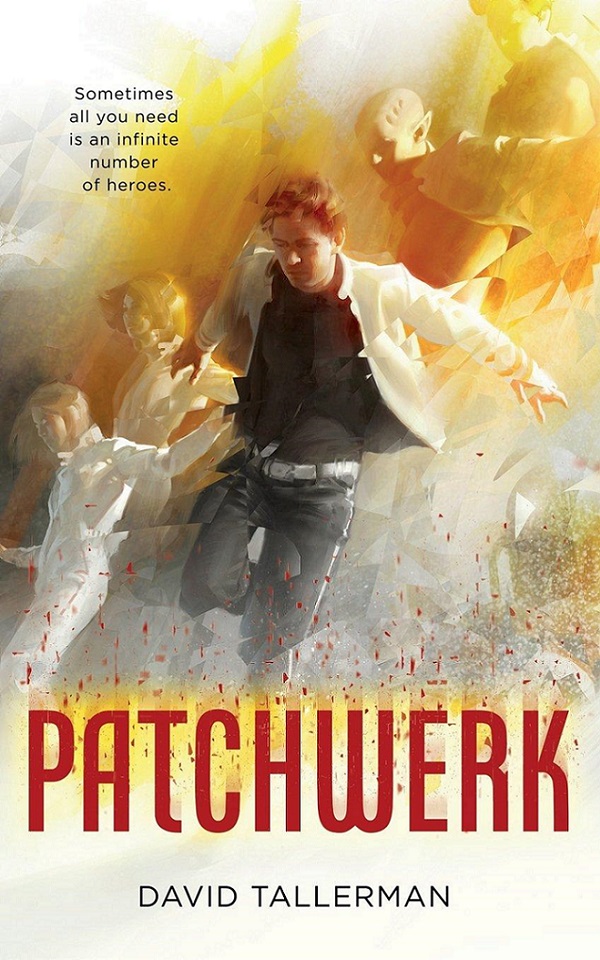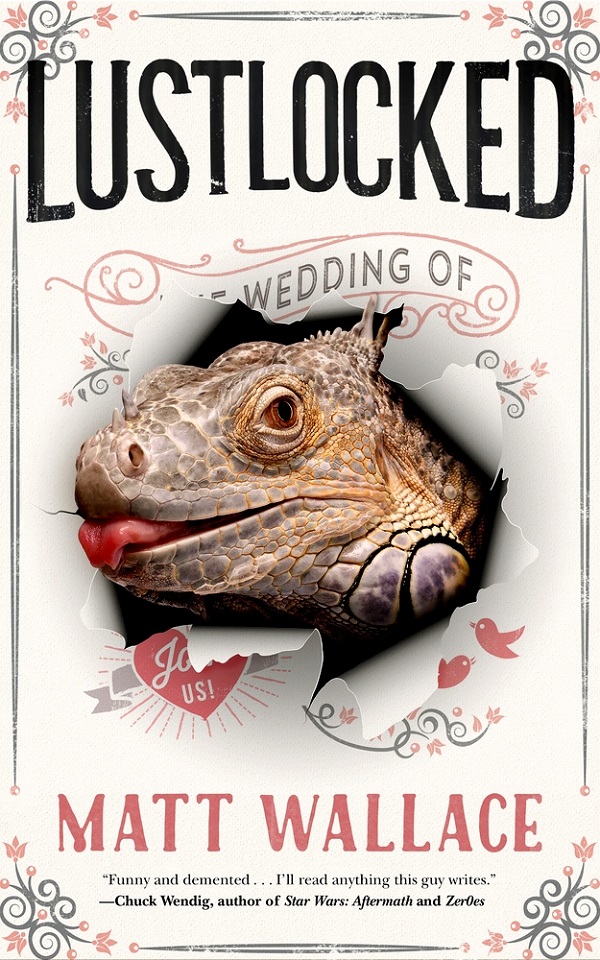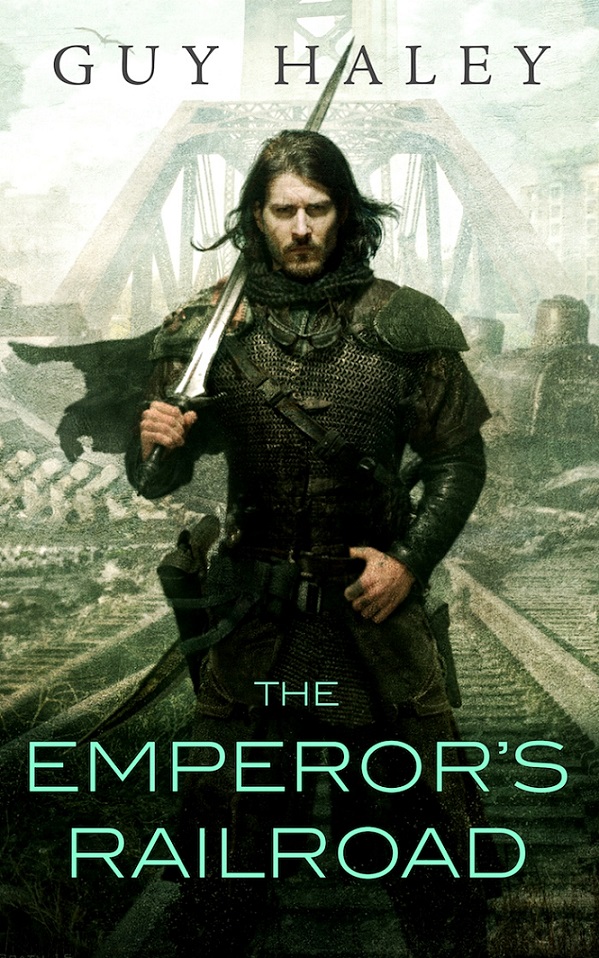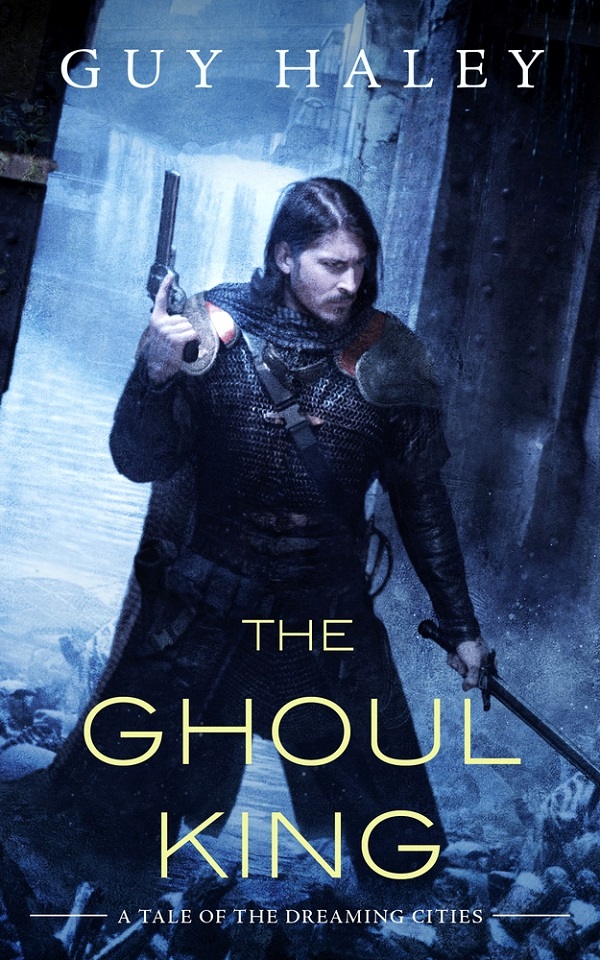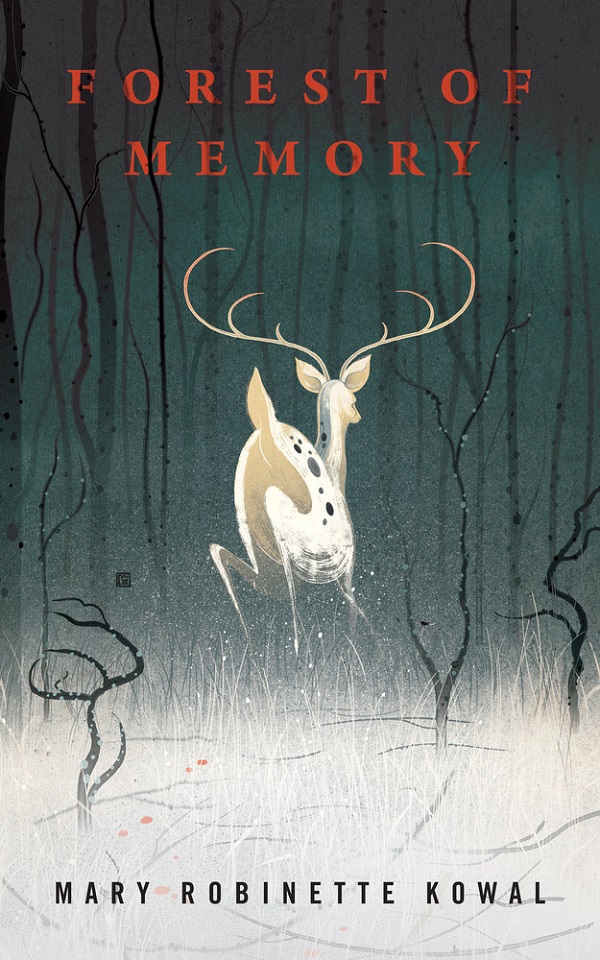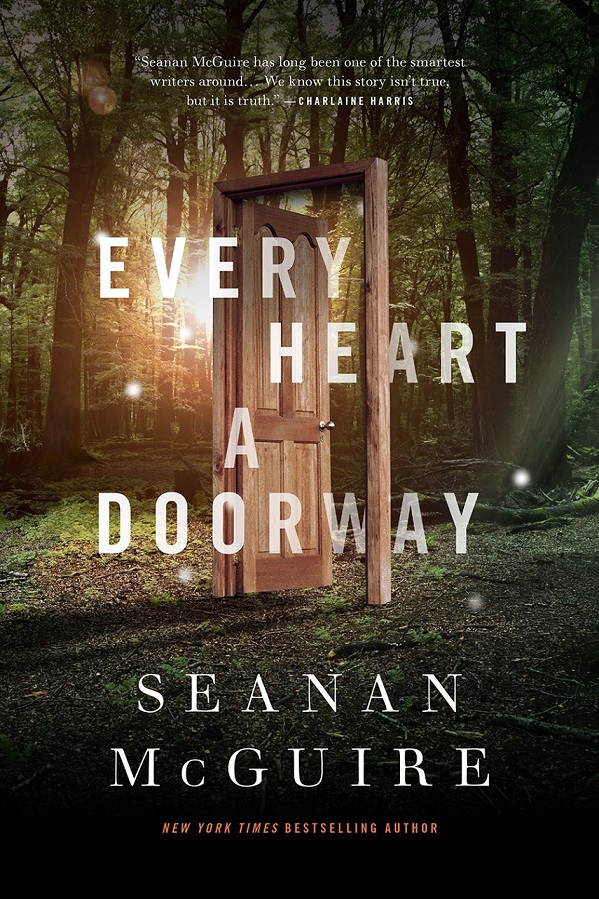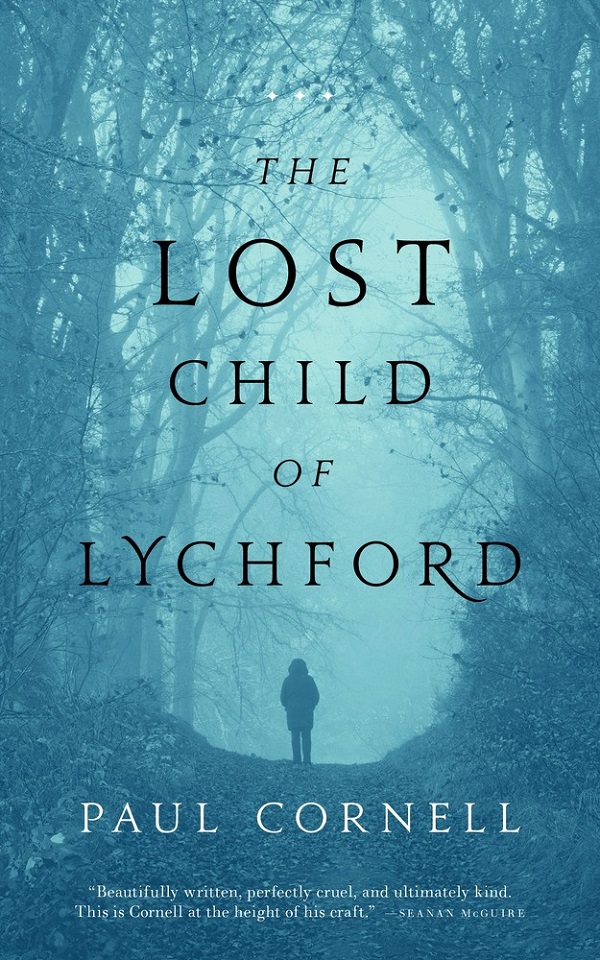Editor’s note: be sure to read the comments on this post for more novellas and more Filer reviews
By JJ: I’m a huge reader of novels, but not that big on short fiction. But last year, I made a concerted effort to read a good sampling of works in the shorter fiction categories. I ended up reading 31 of the novellas published in 2015 (though a few of those were after Hugo nominations closed).
This sort of comprehensive survey of the category was an entirely new experience for me. I found some real gems – several of them utterly unexpected – and perhaps for the first time, I really felt as though I was able to do nominations for the novella category in an informed way. So I decided to do it again this year.
It is not at all uncommon for me to choose to read a book despite not feeling that the jacket copy makes the book sound as though it is something I would like – and to discover that I really like or love the work anyway. On the other hand, It is not at all uncommon for me to choose to read a book in such a case, and to discover that, indeed, the book doesn’t really do much for me.
Thus, my opinions on the following novellas vary wildly: stories I thought I would love but didn’t, stories I didn’t expect to love but did, and stories which aligned with my expectations – whether high or low. Bear in mind that while I enjoy both, I tend to prefer Science Fiction over Fantasy – and that while I enjoy suspense and thrillers, I have very little appreciation for Horror (and to be honest, I think Lovecraft is way overrated). My personal assessments are therefore not intended to be the final word on these stories, but merely a jumping-off point for Filer discussion.
I thought it would be helpful to have a thread where all the Filers’ thoughts on novellas are collected in one place, as a resource when Hugo nomination time rolls around. I’ve opined on a few of these previously on File770, so I’ve put those at the end, so as to not give them an unfair amount of bandwidth.
Which of these novellas have you read? And what did you think of them?
Please feel free to post comments about any other 2016 novellas which you’ve read, as well.
(Be sure to rot-13 any spoilers.)
(fair notice: all Amazon links are referrer URLs which benefit non-profit SFF fan website Worlds Without End)
Cold-Forged Flame, by Marie Brennan (aka Bryn Neuenschwander) (excerpt)
 Tor.com, edited by Miriam Weinberg
Tor.com, edited by Miriam Weinberg
cover art by Sam Weber, design by Christine Foltzer
Synopsis: A woman comes to consciousness with a bloody animal sacrifice laid out before her. She realizes that she is bound to the shaman who did the sacrifice, by a geas that will force her to follow his command: to bring back “blood from the cauldron of the Lhian”. Never mind that he doesn’t tell her who or what the Lhian is, or where the cauldron is located: she doesn’t even know who she herself is – and he won’t tell her that either, because he says it’s safer if she doesn’t remember.
What I thought: I really, really liked this. It features a strong but flawed female character, and avoids or subverts a lot of the quest tropes. This is definitely on my longlist for next year’s Hugo nominations – and I’ll be seeking out some of Brennan’s other works, as well. There’s a sequel, Lightning in the Blood, coming out in April 2017.
Filer Comments:
- Mark-kitteh: For a character who has no idea who she is, she’s strangely compelling, and the story itself is more adventure and (self) discovery than hack-and-slash, although there’s a bit of that too. It’s about 20,000 words, so fairly short for a novella, and it feels like a fully expanded short rather than a compressed novel, but that’s no bad thing – the story is complete by the end, although I suspect sequels are possible, and some intriguing bits of worldbuilding have been revealed.
- Arifel: probably the best novella I’ve read this year – intriguing, well paced fantasy with a great main character and world building that I can’t wait to read more of.
- kathodus: I noticed it on my Kindle when I had just a little time to read, decided to check it out, and remembered that it was recommended as being a tightly written story with good action and characterization, because that’s what it was. I think there is another novella or something written within this world, and I’m looking forward to checking it out.
Patchwerk, by David Tallerman (excerpt)
cover art by Tommy Arnold, design by Christine Foltzer
Synopsis: The inventor of an extremely powerful device, realizing that it could be used as a horrible weapon by people with sinister intentions, is trying to smuggle it out of the country in the cargo hold of an airship. But of course, an evil person who wants the weapon is on the ship as well – and knows way more about it than they should, because of a betrayal from the inventor’s past. This is the story of their confrontation, and the battle for control of the powerful device.
What I thought: Halfway through this story, I was really excited. I really liked where it was going, and how the author was taking it there. But the ending didn’t quite live up to my expectations; I’m not sure why, perhaps it seemed a little too pat. Nevertheless, I still think it is a very good story, and it’s on my Hugo nomination longlist.
Downfall of the Gods, by K.J. Parker (aka Tom Holt) (excerpt)
 Subterranean Press, editor unknown
Subterranean Press, editor unknown
cover art by Vincent Chong, design by Desert Isle Design
Synopsis: A spoiled, petulant goddess who refuses to forgive the man who murdered her favorite musician-poet is overridden by her all-powerful father, who orders her to forgive him anyway. So she decides that her forgiveness will be given only if the man asking for it is able to complete a heroic task: to bring back the musician from the dead.
What I thought: I have more than a passing familiarity with, and appreciation for, Greek and Roman mythology, and this story combines elements of those liberally, and with some inventiveness and snarky humor. Parker’s The Last Witness was my favorite of the thirty-one 2015 novellas I read, and this story makes it clear that his skill in that one was not a one-off or an accident. This is on my Hugo nomination longlist. (Caveat: Readers who expect faithfulness to classical mythology will be disappointed.)
The Devil You Know, by K.J. Parker (aka Tom Holt) (excerpt)
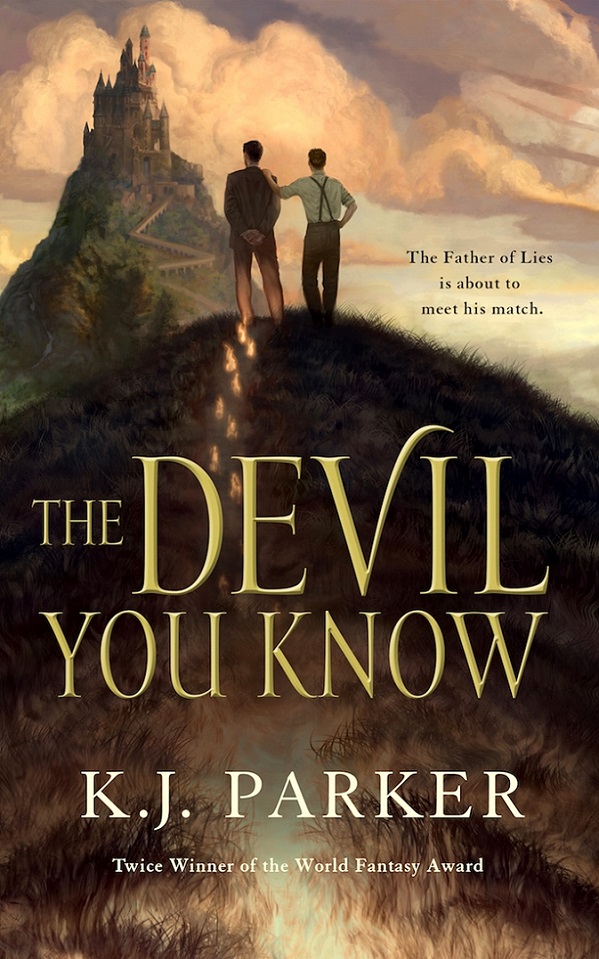 Tor.com, edited by Jonathan Strahan
Tor.com, edited by Jonathan Strahan
cover art by Jon Foster, design by Christine Foltzer
Synopsis (jacket copy): The greatest philosopher of all time is offering to sell his soul to the Devil. All he wants is twenty more years to complete his life’s work. After that, he really doesn’t care. But the assistant demon assigned to the case has his suspicions, because the person making the bargain is not only the greatest philosopher, but also the greatest liar, trickster, and cheat the world has yet known; the sort of man even the Father of Lies can’t trust. He’s almost certainly up to something… but what?
What I thought: I ended up going back a couple of days later and reading the second half of the book (which is approx 120 pg total) again, because the twists are a bit involved and intricate, and it requires a suspension of disbelief to put oneself into the world as it’s been built here. It’s a clever story, but for some reason it did not wow me in the same way as The Last Witness or Downfall of the Gods.
Filer Comments:
- GiantPanda: great version of Faust. Goes on my Hugo longlist
- Arifel: Readable and satisfying but not spectacular.
- alexvdl: Thought it was a pretty good thought experiment, well in my favored “bureacracy porn” milieu. I didn’t realize before I picked it up that it was the sequel to Blue and Gold, but that was just an added bonus.
The Dream-Quest of Vellitt Boe, by Kij Johnson (excerpt)
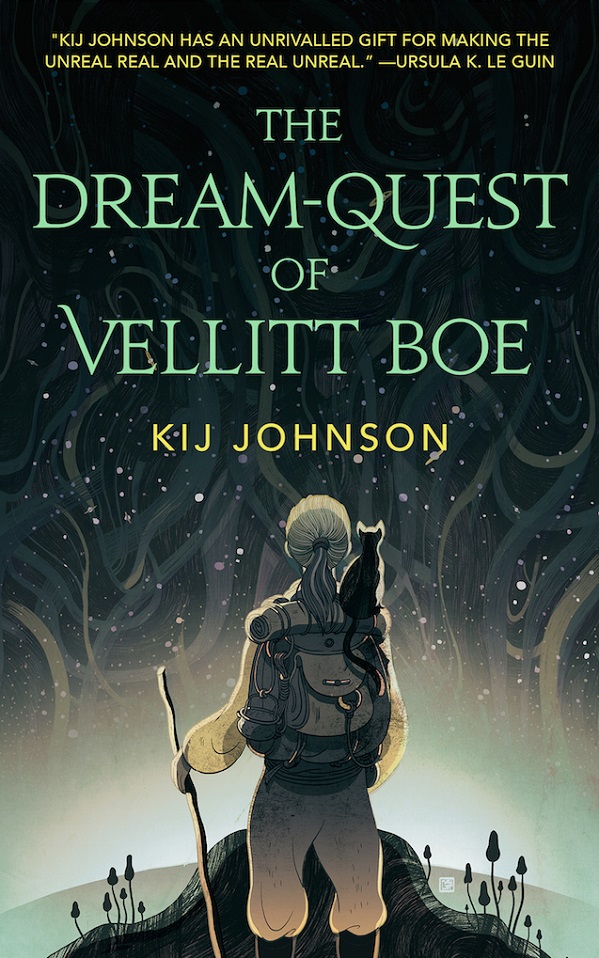 Tor.com, edited by Jonathan Strahan
Tor.com, edited by Jonathan Strahan
cover art by Victo Ngai, design by Christine Foltzer
Synopsis: An older instructor at a women’s college in the Dreamlands must go on a journey to retrieve a young student who has run away with her lover to the waking world; failure would likely mean the vast destruction of the college, the country in which it is located, and all the people there. The protagonist, on their journey through strange lands populated by unfathomable monsters, is joined by a mysterious and possibly magical SJW credential: Following her into [the ship’s cabin], the cat assumed immediate possession of a yak-wool scarf she tossed for a moment upon the bunk. “I need that, cat,” she warned, but it only curled tighter and gazed up with bright eyes. In the end, the scarf remained there for the rest of the voyage.
What I thought: The plot in this story is rather incidental; it’s there to provide a vehicle for the evocative, beautifully-descriptive prose. The inspiration for this story was The Dream-Quest of Unknown Kadath, and it’s my understanding that big Lovecraft fans will especially enjoy it. I’m not one, and I found it enjoyable but not earth-shaking. A strong main character and the aforementioned prose make it well worth the read.
Filer Comments:
- lurkertype: Great characters, good world-building, and some passages I had to reread for their beauty. Does not need familiarity with Lovecraft to work, but that would probably add another dimension (heh). Lives up to HPL by having somewhat archaic words I had to look up – you can gather the idea in context, but there were some pretty cool nouns I didn’t know in there. Needless to say, not with the HPL racism and sexism.
- Mark-kitteh: I have to say it’s a setting idea that just grabbed me from the start… It’s very much a travelogue, and has some of the issues that come along with that – is this just a list of places she goes at authorial fiat? – but I think the character and the charm of the setting really pulls you along, and the stakes get built up nicely. I’m not sure how much you’d need to know Lovecraft’s dreamlands to appreciate it – I certainly found the mythos elements enriched it – and I think the ending wasn’t quite as strong as it might have been, but overall I enjoyed it. (Content note: two mentions of rape, in the sense of mentioning it has or could happen, not in the sense of featuring it in any way)
- Rob Thornton: as a big fan of the original Lovecraft story, overall I found Kij Johnson’s take on the meh side. The story is good and the prose is good, but when the tale is placed in Lovecraft’s Dreamlands, Johnson is up against a standard that is hard to beat. I have really enjoyed Kij’s other works, though, so I look forward to whatever she does next.
- Arifel: while all the Lovecraft went completely over my head I enjoyed the world and the plot (older woman explores world, roles for older women in sexist societies) and there were no obvious triggers
- kathodus: The second trek through Lovecraftia written from the point of view of someone who would have been invisible or reviled in Lovecraft’s writing. This one didn’t have a Lovecraftian atmosphere – it was working within his world, but not working with his vibe. I like what the author did with the gods. And there’s a cat. Or two. But I think just one.
Lustlocked, by Matt Wallace [Sin du Jour #2] (excerpt)
cover photo by Getty Images, design by Peter Lutgen
This volume also contains the prequel novelette “Small Wars”, which was published on Tor.com in January 2016.
Synopsis: The gang at Sin du Jour catering has been contracted for a really, really big job: the wedding of the Goblin King’s son and his fiancée. And the challenge is immense: prepare pairs of numerous courses, in identical-looking forms, to suit both goblin and human gastronomics. But of course, no catering plan survives contact with the diners… the big question is whether the Sin du Jour crew will survive the ensuing catastrophe – and if they do, how will they escape the Goblin King’s wrath?
What I thought: I found the first entry in this series, last year’s Envy of Angels, to be an unexpected, clever, slyly witty delight. This is a worthy follow-up – and the author manages to weave his supernatural worldbuilding in with the real world so deftly that the reader can almost believe it’s all really true.
Filer Comments:
- Mark-kitteh: I thought Lustlocked didn’t play out quite as well as Envy of Angels, although it does feature an excellent take on goblins with a very interesting choice of goblin king…
Pride’s Spell, by Matt Wallace [Sin du Jour #3] (excerpt)
cover photo by Getty Images, design by Peter Lutgen
Synopsis: The Sin du Jour Catering Company finds itself unexpectedly double-booked for events on both the East and West Coasts. So the experienced members of the team stay in NYC to put on a gala dinner for a convention, and the boss takes the newest crew members and the pastry chef extraordinaire out to Hollywood for a movie premiere party. But there’s just one thing that none of them have been told: this time around, they’re all intended to be surprise additions to the menu…
What I thought: This is another fun romp, with some new villains, as well as the reappearance of some old villains – and an unexpected hero. I have to say that I love the author’s imaginative cuisine, with dishes concocted from some pretty unusual ingredients. If you liked the previous entries in this series, you’ll enjoy this one, too.
The Jewel and Her Lapidary, by Fran Wilde (excerpt)
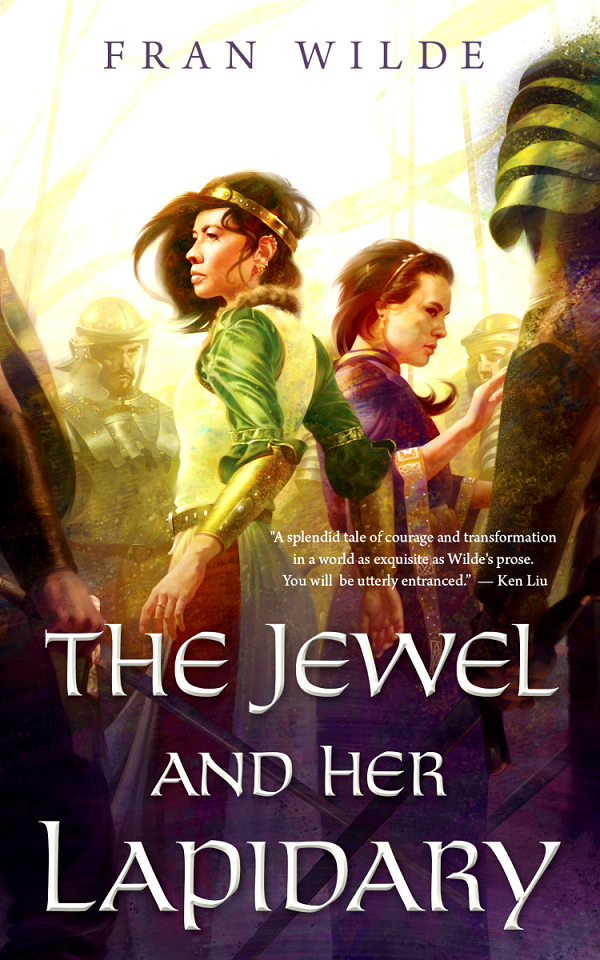 Tor.com, edited by Patrick Nielsen Hayden
Tor.com, edited by Patrick Nielsen Hayden
cover art by Tommy Arnold, design by Christine Foltzer
Synopsis (jacket copy): The kingdom has long sheltered under the protection of its Jewels and Lapidaries, the people bound to singing gemstones with the power to reshape hills, move rivers, and warp minds. That power has kept the peace and tranquility, and the kingdom has flourished… but now the Jeweled Court has been betrayed. As screaming raiders sweep down from the mountains, the last princess and the last lapidary of the Valley will have to summon up strength that they’ve never known.
What I thought: There’s a whole lot of ‘splaining about how the jewel magic and lapidaries are supposed to work mixed in with the story, and I think that the plot and action suffer extensively due to that. There is the strong germ of a good story idea here; it’s just too bad that the execution gets so bogged down in the infodumping. I’d like to see the author rework this into a really enjoyable novel. (And I have to say that the cover is one of my favorites from 2016.)
Filer Comments:
- Arifel: This is short – a long novelette rather than a novella, even – but very well put together and definitely worth a read. Only disappointment was that Sima is not actually an aged-up Toph Beifong as the cover seemed to indicate.
- Mark-kitteh: Not quite as good as recent highlights like Forest of Memory or Every Heart a Doorway, but still a worthwhile entry… It’s a fascinating setting and magic idea, and I suppose that Wilde could either have stopped for a 10,000 word exposition on how it all works or start the story with a crisis in media res and hope that the idea comes through. Obviously she goes for the latter, and although it’s not 100% successful it’s definitely the right choice for a novella. I kept wanting a bit more clarity on how the jewels worked, but as I didn’t want her to stop the story for some As You Know Bob I can’t really complain too much.
The Emperor’s Railroad, by Guy Haley [The Dreaming Cities #1] (excerpt)
cover art by Chris McGrath, design by Christine Foltzer
Synopsis: A young boy and his mother struggle to reach a relative in a faraway town after everyone else in their own village in a post-apocalypic U.S. is destroyed by zombies. They are lucky enough to meet up with a Knight who protects them on their journey (for a sizable fee, of course), against zombies and “angels of God” (from what appears to be a dubious religion).
The Ghoul King, by Guy Haley [The Dreaming Cities #2] (excerpt)
cover art by Chris McGrath, design by Christine Foltzer
Synopsis: A healer is interrogated by the authorities about his role in an illegal attempt to retrieve lost and forgotten technology from a dead city – an attempt which, of course, also includes the aforesaid Knight. This time, in addition to zombies, angels, and a whole passel of religious talk, there are “ghouls” – a higher form of zombie which has retained some thinking faculties and is thus a far more threatening adversary.
What I thought: I swear, all zombie stories should be required to include a plausible origin story in order to be published (at least Seanan McGuire, bless her, managed a capital job of that). All of the other zombie stories I’ve read seem to have been written by South Park’s gnomes:
Step 1: Normal world
Step 2: ?????
Step 3: ZOMBIES!!!
While the post-apocalyptic worldbuilding is somewhat interesting, I have to admit that I never found these stories particularly gripping or compelling, and I found the religious aspect simply tiresome. And since they’re told from the point-of-view of someone other than the Knight, I felt as though I never really got to see enough of him to feel invested in him. There are hints that the angels are not really angels, but something more interesting – but at this point, I’m not interested enough to read the third story to find out. Rating: 2 Mehs. YMMV.
Runtime, by S. B. Divya (aka Divya Srinivasan Breed) (excerpt)
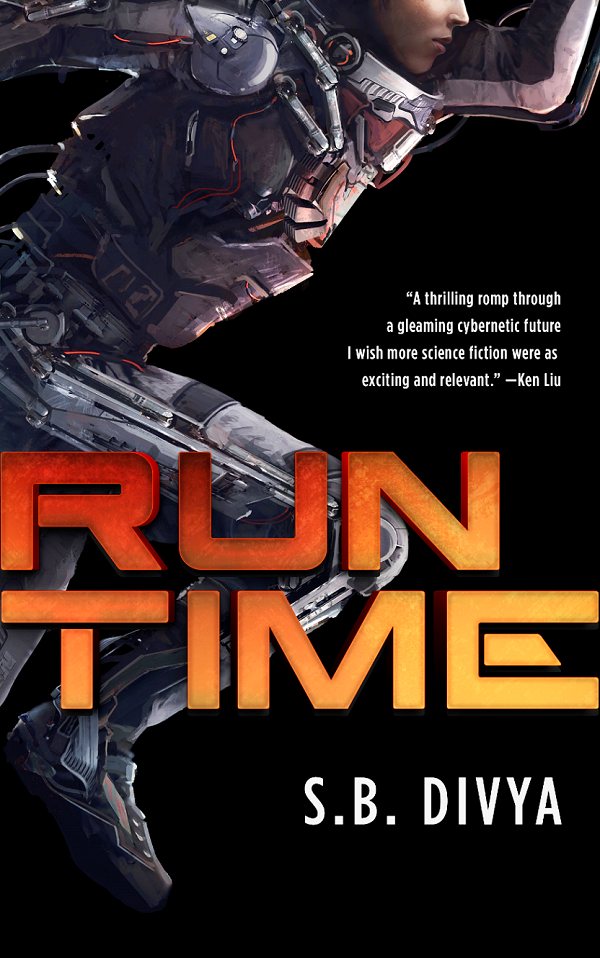 Tor.com, edited by Carl Engle-Laird
Tor.com, edited by Carl Engle-Laird
cover art by Juan Pablo Roldan, design by Christine Foltzer
Synopsis: A young person who has taught themselves computer engineering since they were a child enters a speed-and-endurance race against well-equipped, well-funded professionals, supported only by home-built-and-programmed cybernetic augments. The prize money for placing in the top 5 would mean being able to earn full personhood, for themselves and for their siblings, and a future livelihood. But on the brink of victory, they are faced with a terrible ethical choice.
What I thought: I loved this short, fast-paced novella. Even in the short length, the author does a good job of creating a complex, nuanced main character. I’m going to be avidly watching for more stories by this author.
Filer Comments:
- Arifel: I had a couple of worldbuilding nitpicks (mostly the idea that young people are undergoing gender neutralising surgery as a fashion trend…) but overall I found this well worth my time.
- Arifel: [story] does have some gender dysphoria and dysfunctional parent child relationships
Dreams and Slumbers, by Seanan McGuire [October Daye]
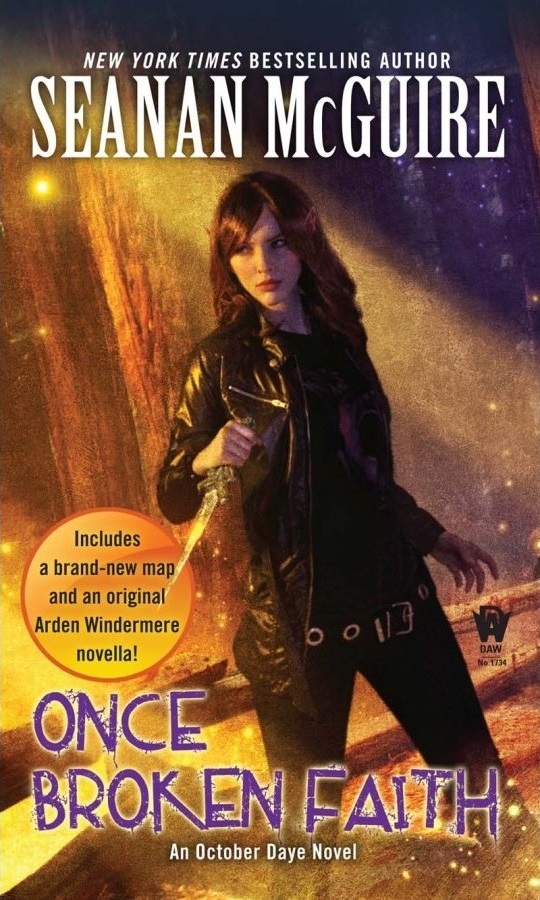 (included with the novel Once Broken Faith)
(included with the novel Once Broken Faith)
DAW Books, edited by Sheila Gilbert
cover art by Chris McGrath, design by G-Force
map by Priscilla Spencer
Synopsis: After the conclave is over, Queen Arden Windermere in the Mists has a choice to make, and no one to help her make it. This is the story of Arden’s attempts to awaken her elf-shot brother, Nolan, from his 100-year sleep. At first, Arden believes that all she has to do is give him the cure, but it’s not that simple, because in addition to being elf-shot, Nolan was poisoned – and once he’s given the cure for elf-shot, he will die of the poison. Can Arden find an antidote to the poison? And does she really want to wake him up, when she will have to face him with the fact that she has not yet really established herself, or accomplished anything, as Queen?
What I thought: I thought that this was a great coda to Once Broken Faith, and a great addition to the October Daye universe. It gives the reader insight into, and further character development of, peripheral characters in the series. But like Once Broken Faith, it’s really only going to have a good meaning and impact for those who’ve read the novels in the October Daye universe.
Having said that, the October Daye universe is on my 2016 Hugo Best Series shortlist.
Down and Out in Purgatory, by Tim Powers (Kindle sample)
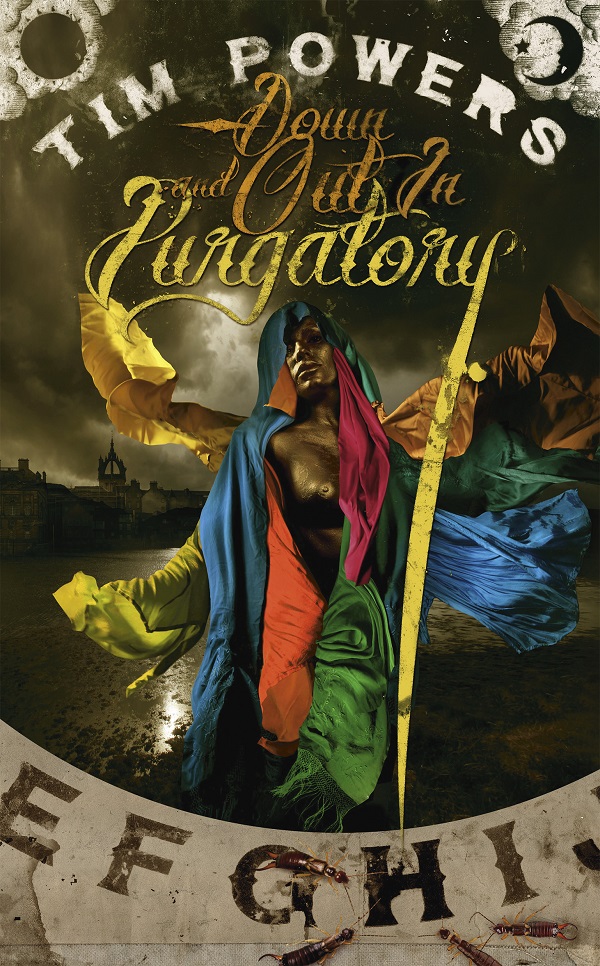 Subterranean Press, editor unknown
Subterranean Press, editor unknown
cover art by Dave McKean, design by Desert Isle Design
Synopsis: Years ago, one of the guys in the college gang married the girl in the gang – then later on, murdered her. Another one of the gang, who was in love with her, has sworn revenge and spent the last 6 years looking for the killer. A PI finally finds him – in the morgue, having died happy at his Malibu estate with a drink in his hand and his latest girlfriend in his bed. The protagonist thinks the killer got off way too easy, and decides to get the assistance of a practitioner of the occult in achieving revenge in the afterlife.
What I thought: I read Salvage and Demolition a couple of months ago and absolutely loved it, so I had high hopes for this. I thought it was good, but it didn’t quite get to “great” for me. I would have liked to have gotten to see a little more of what was behind the protagonist’s life history and motivations. Worth reading.
The Drowning Eyes, by Emily Foster (excerpt)
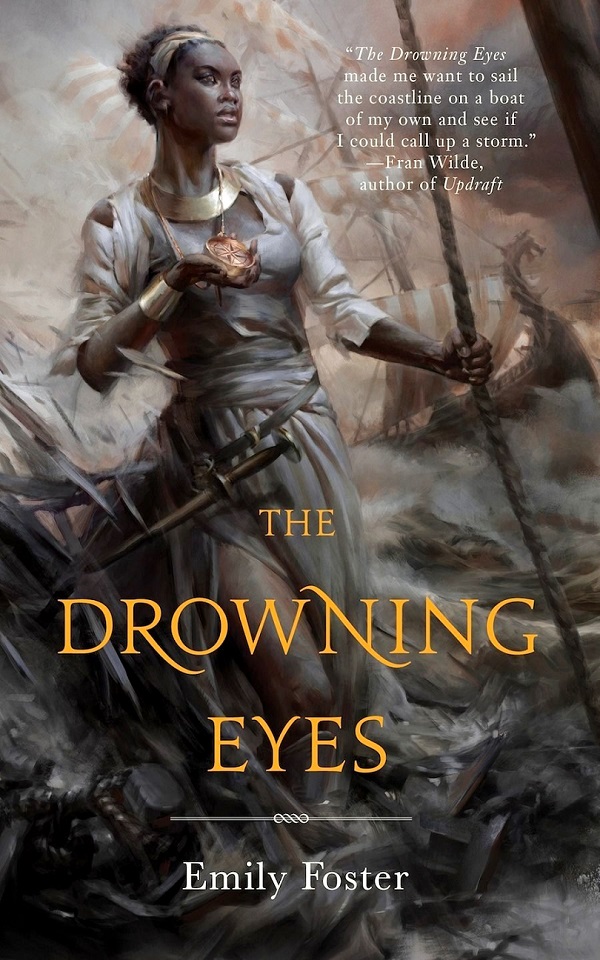 Tor.com, edited by Carl Engle-Laird
Tor.com, edited by Carl Engle-Laird
cover art by Cynthia Sheppard, design by Christine Foltzer
Synopsis: Tazir captains a ship in a world where Windspeakers shape the weather to help ships along their routes – for a price. But now the world is threatened by reavers on Dragon Ships who leave only destruction in their wake. Tazir and her crew take on a wealthy young female passenger and leave port in time to escape the Dragon Ships – but who is the mysterious young woman, and why is she having terrible nightmares?
What I thought: I enjoyed this a lot more than I thought I would based on the synopsis. It does some nice character development and worldbuilding without having to resort to infodumping (it’s what I wish The Jewel and Her Lapidary would have been), and the plot does not follow a predictable path. This is on my Hugo Novella longlist.
Filer Comments:
- Arifel: This might have been a bit too subtle for me as there were a lot of dynamics between the different crew members and between Tazir and Shina that didn’t really come through for me until right at the end, but I still enjoyed.
- Mark-kitteh: I thought it was going to get rather cliched but the middle section had some good characters and an interesting ambiguity about how the Windspeakers get created (although it was a theme that The Fifth Season looked at much better). Unfortunately I didn’t think it stuck the ending at all.
The Ballad of Black Tom, by Victor LaValle (excerpt)
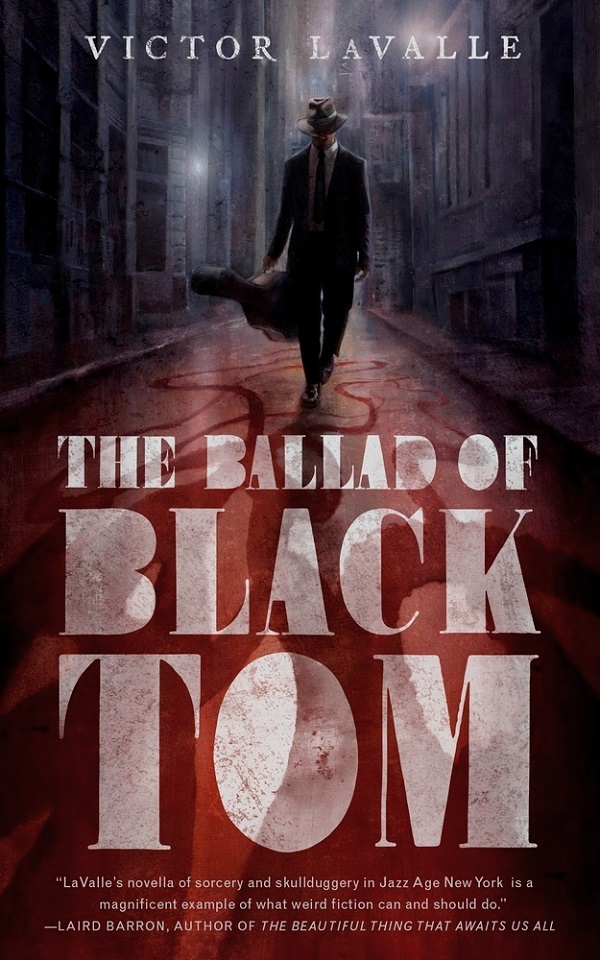 Tor.com, edited by Ellen Datlow
Tor.com, edited by Ellen Datlow
cover art by Robert Hunt
Synopsis: The protagonist of the story is a young black man living in Harlem, who survives in New York City and supports his ailing father by engaging in petty scams and cons – enduring constant harassment and abuse from police and other white people. Despite his utter lack of singing and guitar-playing ability, he is hired by a mysterious old man to provide background music at a very unusual house party.
What I thought: This novella is a response, written by a black man, to H.P. Lovecraft’s most notoriously racist story, The Horror at Red Hook. I think that fans of Lovecraft will enjoy the way it deconstructs and re-writes HPL’s racism into a uniquely black perspective. Even though Lovecraft, Horror, and Weird really aren’t my thing, I found it interesting and worth reading.
Filer Comments:
- emgrasso: checks a lot of boxes for Lovecraftiana, but I don’t think it really works as a whole. The sections where the story had atmosphere that worked instead of feeling like it was just going through the motions weren’t the Lovecraftian ones. And even outside the supposedly spooky stuff, there was an important plot point regarding a “shocking” straight razor that fell flat for me – what else would a poor black man in the 1920s have shaved with?
- Bonnie McDaniel: The story suffers, in my view, from an unnecessary POV shift about halfway through. It would have made for a tighter focus and characterization if the author had stuck to the original POV character throughout, although as the story unfolded, that would have resulted in going to some pretty dark places. This one would also have been better at a greater length, I think. As it is, it’s okay, but nowhere near the fantastic Lovecraft Country.
Everything Belongs to the Future, by Laurie Penny (excerpt)
 Tor.com, edited by Patrick Nielsen Hayden
Tor.com, edited by Patrick Nielsen Hayden
cover photo by Oleksiy Maksymenko, design by FORT
Synopsis: In the near future, the wealthy and talented benefit from vastly-extended lifespans due to a revolutionary drug. A group of futuristic underground Robin Hoods are doing their best to see that the “ordinary” people have the chance to enjoy some of those benefits. But there’s a Judas in their midst: one who has neither their goals, nor their best interests, in mind…
What I thought: Oh, wow. This is a powerful story of “haves” versus “have nots”, of deceit versus informed consent, of cowardice and heroism, of betrayal and retribution and remorse and repentance. I do not recommend reading this when spoon levels are low – but I definitely recommend reading it. This is my first choice for Hugo Best Novella.
Brushwork, by Aliya Whiteley (read online)
 GigaNotoSaurus, edited by Rashida J. Smith
GigaNotoSaurus, edited by Rashida J. Smith
Synopsis: In a climate-devastated future world, crops are grown in biodomes by workers privileged enough to be allowed to escape the horrible conditions outside, and the fresh fruits and vegetables are sold to those who are wealthy enough to afford them. But the “have-not”s outside the domes have a plan for changing the status quo.
What I thought: This is an incredibly uncomfortable story to read right now, because the main theme is echoed repeatedly throughout the narrative: just how willing will people be, to make the moral and ethical compromises which throw their co-humans “under the bus” – as long as they think that they themselves will benefit? Just how large does the possibility of personal reward have to be, before human beings will choose to be complicit in sacrificing others — and then to look the other way when the inevitable happens? This is a moving and powerful story, and it is on my Hugo Novella longlist.
Filer Comments:
- Dawn Incognito: Post-apocalyptic UK hitting on the gulf between generations and haves vs. have-nots.
- Cassy B.: thanks for the pointer to it. Powerful story.
The Arrival of Missives, by Aliya Whiteley (excerpt)
 Unsung Stories, edited by George Sandison
Unsung Stories, edited by George Sandison
cover art by Jana Heidersdorf, design by Martin Cox
Synopsis: A young woman, on the cusp of adulthood after World War I, learns that she has a much larger destiny than even her own high aspirations – but if she follows that destiny, it will mean giving up her own hopes and plans. On May Day, on the village green, she will have to make a choice that will affect her life forever… and change worlds.
What I thought: Well, Brushwork is indeed a powerful story – but I was absolutely blown away by this one. I’m still thinking about it, days later. This is a story about free will, and the choices we make, and the fact that no matter what choice we make, there will often be a cost – to ourselves, or to someone else. This book will speak to anyone who has ever had to sacrifice something life-changingly important to themselves in order place priority on what’s best for someone else (I would describe its theme as “The Lady Astronaut from Mars on speed”). Right now the e-book is still rather expensive, but I encourage everyone to try to get access to it, if it’s not affordable, through the library, a loan from a friend (the kindle version is loanable), or a purchase. I think you will be very glad you did. This is definitely going on my Hugo Novella ballot.
The Warren, by Brian Evenson (excerpt)
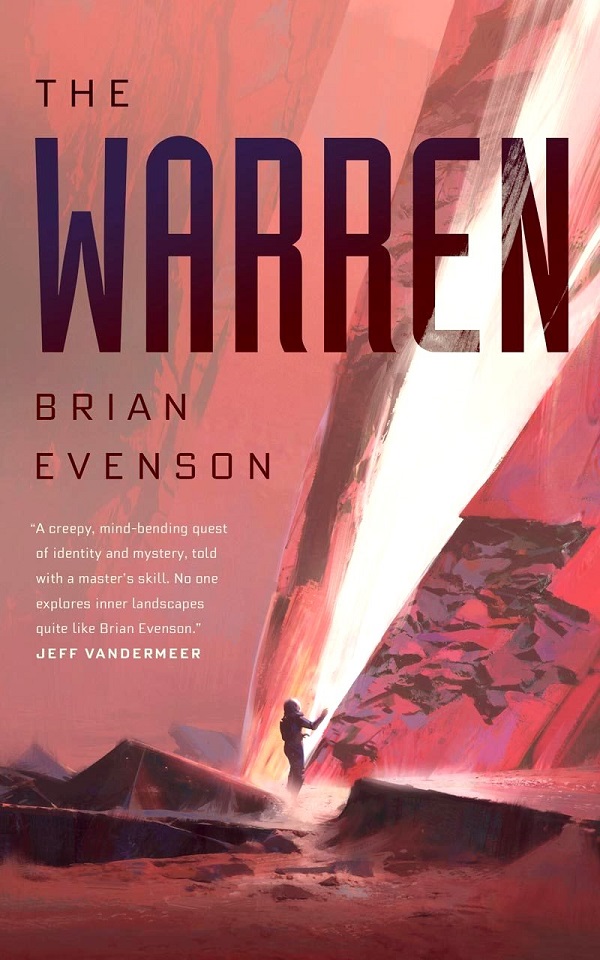 Tor.com, edited by Ann VanderMeer
Tor.com, edited by Ann VanderMeer
cover art by Victor Mosquera, design by Christine Foltzer
Synopsis (jacket copy): X doesn’t have a name. He thought he had one – or many – but that might be the result of the failing memories of the personalities imprinted within him. Or maybe he really is called X. He’s also not as human as he believes himself to be. But when he discovers the existence of another – above ground, outside the protection of the Warren – X must learn what it means to be human, or face the destruction of their two species.
What I thought: I was really looking forward to reading this, based on the jacket copy. I’ve read at least 32 of the Tor.com novellas now, and although I liked some of them a lot, and some of them not so much, this is the first one where I’ve actually wondered why it got published. I think that there are a few seeds of a good story here – but that it’s seriously undercooked and full of been-done-before. It’s like a mashup of Wool, Flowers for Algernon, and Impostor. Not recommended, at least by me.
Filer Comments:
- Mark-kitteh: I think this novella gives you fair warning when it begins with a dedication to Gene Wolfe. Someone called X has awoken in a place they know is called the warren. They seem to think they have been created, and that they have the memories of their predecessors, who were also created. They know the hostile conditions will kill them soon, and they’d like to create themselves a successor, but they can’t, and the computer they can talk to is failing and unhelpful. Events occur which start to explain what might be going on, and then I turned the page to see “About the Author” staring at me, and I didn’t really know what it had all been about. If someone else reads this and says it was a wonderful multi-layered narrative then I’ll totally believe them, but I was tired and I just went huh?
A Window Into Time, by Peter F. Hamilton (excerpt) (e-book only)

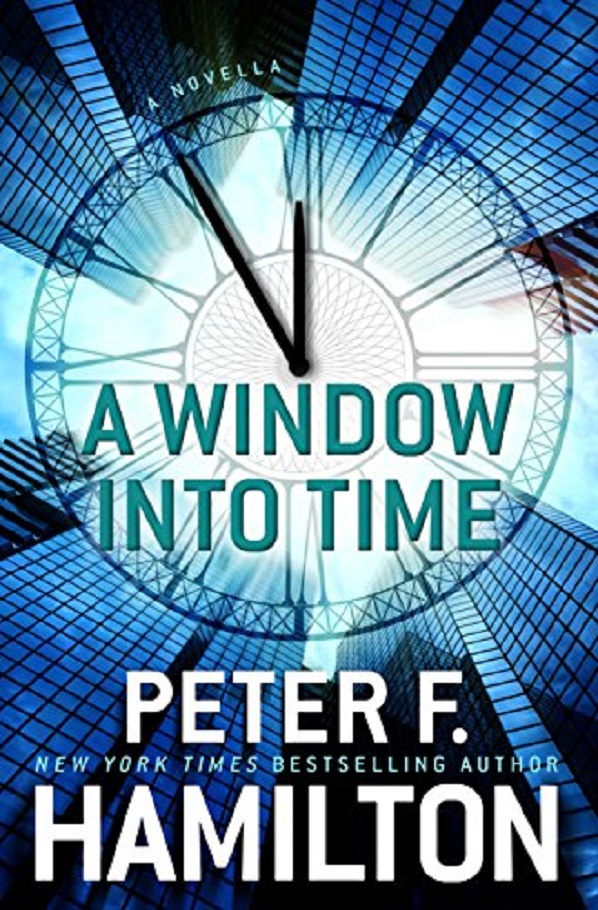 Del Rey / Pan Books, edited by Bella Pagan
Del Rey / Pan Books, edited by Bella Pagan
cover art by Kathleen Lynch, using images from CHAINFOTO24/Shutterstock (buildings) and ovi 801/Shutterstock (clock)
Synopsis: A 13-year-old boy with an eidetic memory (and probably a strong streak of Asperger’s) remembers everything he’s ever seen, heard, or experienced. And suddenly, he’s remembering flashes of someone else’s memories. How? And why? And will he be able to figure it out in time to save another person’s life?
What I thought: I liked this better than I thought I would, given the YA protagonist. I would say that it probably provides some good insights into the thought processes of someone who is in the Asperger’s spectrum. The author nails the ending, I think, but it didn’t quite wow me enough for me to consider it for Hugo nomination.
This Census-Taker, by China Miéville (excerpt)
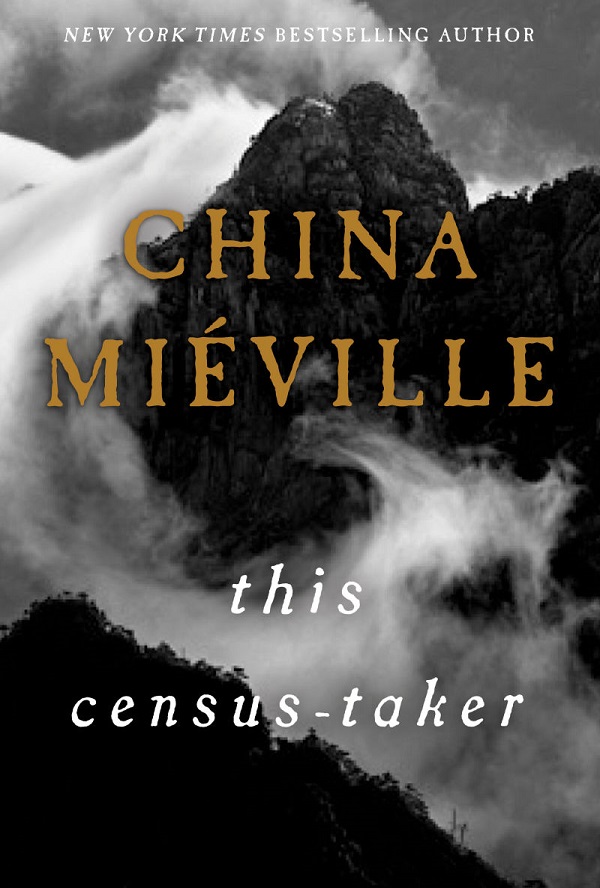 Del Rey, edited by Mark Tavani
Del Rey, edited by Mark Tavani
cover photo by Wusheng Wang, design by David G. Stevenson
Synopsis: A little boy living in a cottage high above the nearby town witnesses his father killing his mother – or does he? At any rate, she’s gone – and his father is becoming progressively more angry, irrational, and abusive. But then a stranger comes to town – a stranger who sees that something is wrong, and who may be in a position to help.
What I thought: Readers who are looking for any sort of explanation – any sort at all! – will likely be very frustrated with this story. It offers lots of provocative descriptions, and tantalizing hints and clues, but nothing whatsoever of any real explanation or resolution. It’s an interesting read, but in the end, in order for me to love it, I needed a little more than the story was willing to provide. Readers who are okay with unsolved mysteries may find a lot here about which to think and speculate.
Filer Comments:
- Dawn Incognito: Challenging. Mysterious, haunting, and occasionally brutal. If you’re familiar with Miéville this should not be surprising. There are many questions, and I’m sure many clues, but no easy answers. I may reread shortly to see what I can pick up that made no sense the first time through. The narrative shifts, mostly first-person with the odd second- and third-. Possibly a distancing mechanism from the traumatic events the narrator is going through. Possibly something else. I’m not sure I “got” it. I’m not sure I will. But it will stay with me for some time. Worth the challenge, I think.
- Bartimaeus: Weird, creepy tale of a small town with sinister secrets lurking under the surface. This story has many intriguing enigmas and a very unreliable narrator. For starters, did his mother kill his father, or his father kill his mother? Miéville’s prose is just hypnotic here, and I love the atmosphere he builds. Though the ending doesn’t reveal all the answers, it is very tantalizing. (I suspect this aspect won’t work for everyone). I really loved this and will probably re-read it sometime.
- More rot-13 discussion in this thread
- Vasha: A good essay on This Census-Taker by Daniel Maidman (to be read only after the book).
The Last Days of New Paris, by China Miéville (excerpt)
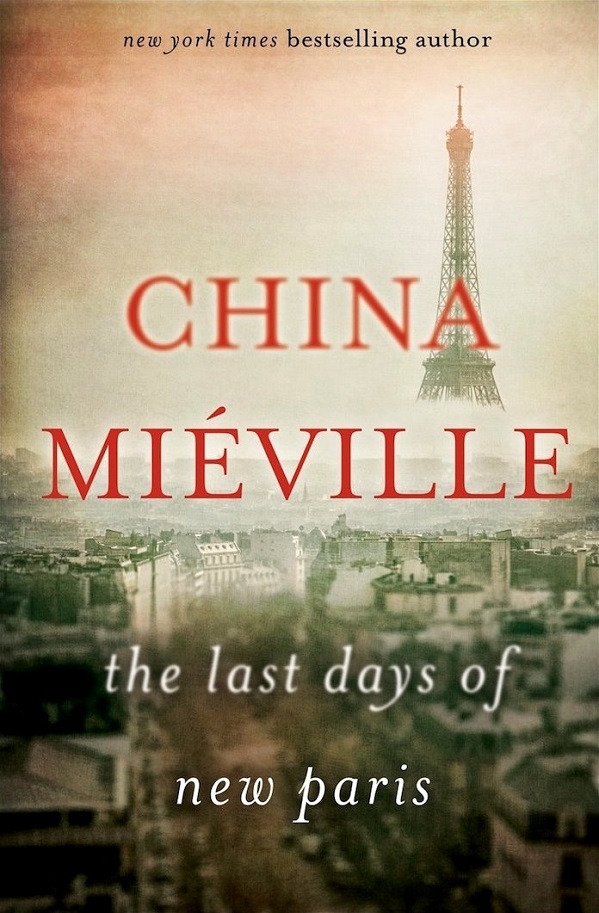
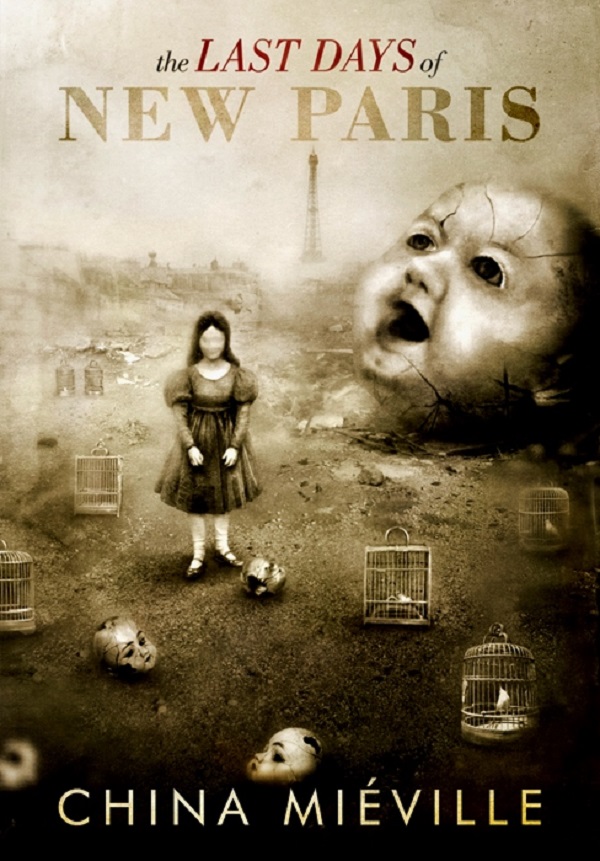 Del Rey / Subterranean Press, edited by Mark Tavani
Del Rey / Subterranean Press, edited by Mark Tavani
Del Rey cover photo by Claudia Carlsen, design by David G. Stevenson
Subterranean Press cover art by Vincent Chong, design by Desert Isle Design
Synopsis: In 1941, an “S-blast” is set off in Nazi-occupied Paris. Nine years later, a Surrealism expert who is a member of the Resistance movement lives a hellish existence in a city overrun with living Surrealist entities, and demons conjured by the Nazis in an attempt to fight back.
What I thought: This story definitely falls into the category of The New Weird. As with Bellitt Voe, the plot here (such as it is) is merely a vehicle for the vivid imagery and nonsensical occurrences. Readers who are fans of Lovecraft, or Surrealism, or VanderMeer’s Southern Reach trilogy, may very well enjoy this. I have a college minor in French language, history, and culture, I love Paris, and I have a bit of amateur art education, so hoped that I would enjoy New Paris more than I did. I found the Area X books interesting in a “but a little bit of this goes a loooooong way” sense – and after those, apparently little of my appetite for such things was left over for this story.
There is a “Notes” section, keyed by page number, describing the origin of each of the Surrealist manifestations. Readers may wish to flip back to this each time one appears in the story, as I think it will enhance the appreciation of the imagery. Simultaneous access to Google to look up the referenced images would probably enhance appreciation, as well.
I would say that this is definitely a “Marmite” story – readers will likely either love it or hate it. My reaction was “meh – I’ve got another book sitting here that I’d really rather read”.
Filer Comments:
- Rob Thornton: It’s a magic realist book about Surrealism and WWII, but the first 50 pages or so felt like a drag. Mieville is usally a crackerjack prose writer but something is missing here. Maybe it’s because I dearly love Lisa Goldstein’s The Dream Years (which is similar in some ways). But I’ll try it again.
Forest of Memory, by Mary Robinette Kowal (excerpt)
cover art by Victo Ngai, design by Christine Foltzer
Synopsis: This story is a recounting of an experience in a near-future time when everyone is wired into the net all the time, by someone who hunts down antiquities and documentation of rare experiences and sells them to collectors for a living. The protagonist gets kidnapped, and cut off from the net, and forced to deal with her kidnappers.
What I thought: Trigger Warning for ALL THE TYPOS. This is an integral part of the premise for the story, but it annoyed the hell out of me and kept kicking me out of it. I really liked the premise of the story, and I thought that it showed a lot of promise, but it just didn’t go far enough to satisfy me. I’m hoping that she’ll develop it into a novel (if she does, I’ll just have to figure out how to deal with the typo angst).
Filer Comments:
- Arifel: The worldbuilding in this is subtle and believable and its very readable but ultimately didn’t feel like a finished story to me.
- Mark-kitteh: this is a really interesting and elegant story… There’s perhaps not that much to the story, but MRK really digs into her theme and fills the whole story with it. One thing though – there’s a gimmick in which the story is being typed on an antique typewriter, and so there are typos and so on. Sent me mad.
- Cat Eldridge: Forest of Memory was originally part of the METAtroplis series, so it feels like a part of something bigger because it was. I found that that since there was a shared universe framework, some of the stories really didn’t work if you hadn’t read the stories preceding a given story.
Penric and the Shaman, by Lois McMaster Bujold [World of the Five Gods, Penric #2] (Kindle sample)
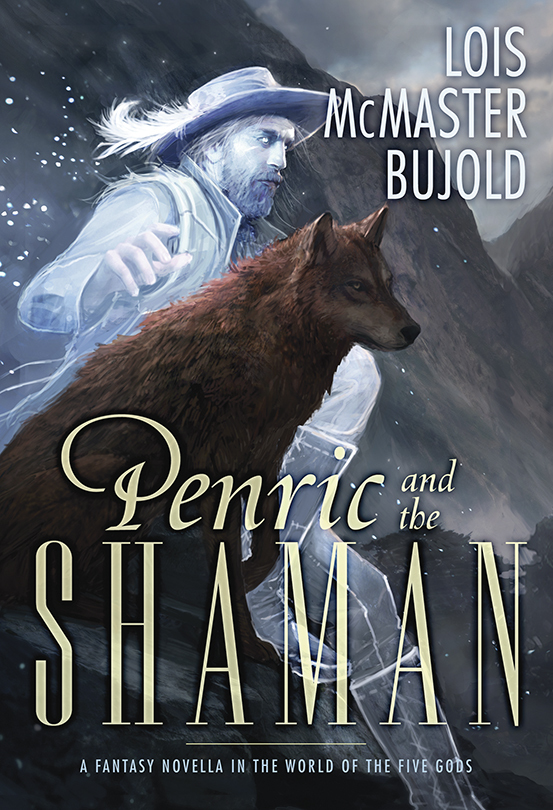 Spectrum Literary Agency (2016) / Subterranean Press (February 2017), editor unknown
Spectrum Literary Agency (2016) / Subterranean Press (February 2017), editor unknown
Spectrum cover art “Grindelwald” by Jakob Samuel Weibel (1771-1846)
Subterranean Press cover art by Lauren St. Onge
Synopsis: This sequel picks up 4 years after Penric’s Demon left off: with Penric gradually adjusting to the 12-personality demon which inhabits his psyche (and with the demon adjusting to him). There’s the mystery of a murder and a missing man – and Penric is tasked to solve both.
What I thought: It’s a testament to Bujold’s supreme skill that this story, like its predecessor, is just so quietly awesome. The conflicts are, for the most part, subdued – but no less impactful for that. Penric is a flawed but wonderful character who is easy to care about – and his quiet, thoughtful approach, tempered with a wry humor, makes a really nice contrast to the all-too-common over-the-top superhero protagonist.
Filer Comments:
- lurkertype: I read Penric and the Shaman when it came out in June and quite liked it. I like the earlier part of that world (The Hallowed Hunt, Penric’s Demon) more than the later part. I like the Five Gods.
- Lee Whiteside: A worthy follow up to the first novella.
- Mark-kitteh: +1 on Penric and the Shaman – she took it in an interesting direction, I thought.
- ULTRAGOTHA: Penric and the Shaman is very, very good, too.
- Greg Hullender: I just read and reviewed Penric and the Shaman and gave it five stars… I think this novella is very readable even for someone who didn’t read Penric’s Demon.
- Cheryl S.: I also just read Penric and the Shaman. It was good and I liked it, but it was too creamy smooth for me to really like it. I think she’s such a good writer, but not in the least showy and sometimes I find that less than interesting, even if all the parts work well. I wonder if the reason her longer stuff works better is because then the accumulation of her talent and skill is more noticeable?
Penric’s Mission, by Lois McMaster Bujold [World of the Five Gods, Penric #3] (Kindle sample)
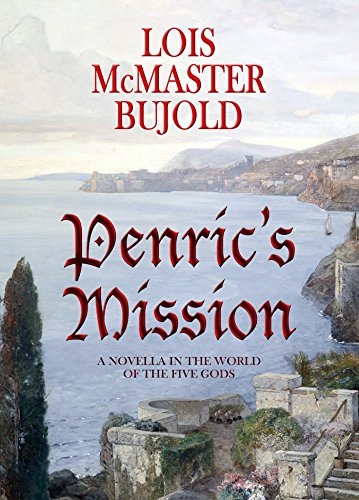 Spectrum Literary Agency, editor unknown
Spectrum Literary Agency, editor unknown
cover art “View of Ragusa” by Emil Jakob Schindler (1842 – 1892)
Synopsis: Penric has been sent on an undercover mission to another country, to recruit a highly-skilled general who has offered to aid in their own military endeavors. But immediately upon disembarking from his ship, Penric is taken captive by the King’s forces and thrown into a black hole in the prison. What’s more, the general himself has been imprisoned. Penric must somehow find a way to retrieve the situation – balancing duty with personal obligation – with the help of the general’s highly-intelligent sister.
What I thought: Penric has come into his own at this point. He has assimilated well with his demon and its dozen different personalities, and has learned how to use their knowledge and powers to enhance his own intelligence and capabilities. As with the previous stories, Penric’s mission here is to try to reconcile doing his official job with doing what he personally feels is right – and like the previous stories, this one makes the reader feel quietly satisfied and uplifted by the ending. Caveat: this one ends in a bit of a “what happens now?” place, and readers who find that frustrating may wish to wait until the fourth story is released.
Filer Comments:
- ULTRAGOTHA: unlike the other two novellas, this one ends in a place that cries for another story *right now*. Bujold is writing these novellas fairly quickly (at lightning speed, for her) so I’m hopeful maybe next year?
- Greg Hullender: While it doesn’t have the plot sophistication of Penric’s Demon or Penric and the Shaman, the writing is excellent, and the story is pure fun.
- Nickp: Based on the title, I was half-expecting (and half hoping for) Penric’s expedition to convert the Roknari to Quintarianism. But not that kind of mission. Pseudo-Byzantine Empire was fun, anyway.
- robinareid: it’s pure joy and love and happiness on all levels.
Every Heart a Doorway, by Seanan McGuire [Wayward Children] (excerpt)
cover photos by Colin Anderson (forest), Martin Barraud (doorway), design by FORT
Synopsis: This is a dark, bittersweet story about the children who fall into fantasy worlds where they become heroes, and then find themselves lost and unable to cope when they are returned to the “real” world. An adult who was one of those children brings as many troubled children as she can find and save to her boarding house, an environment where they can be among others who understand and empathize with their pain.
What I thought: Damn that Seanan McGuire, damn her! Every time I read the backcover synopsis for one of her stories, I think, “Well, that doesn’t sound as though I’d much enjoy it” – and then I read it and enjoy it immensely. On my novella list for next year’s Hugos right now. TW for graphic mutilation scenes. A prequel, Down Among the Sticks and Bones, will be published in June 2017.
Filer Comments:
- emgrasso: short but intense, with a main viewpoint character I really appreciated and a wonderful ending. I’m very glad there will be more stories in that universe.
- Snodberry Fields: it was good. If you have enjoyed other works by Seanan McGuire you should read this too. The world building and characterization was first class! I just loved reading about these people. I cannot imagine that his will not be on my ballot next year.
- Ryan H: I’m going to second Every Heart a Doorway. Anyone who is interested in identity and representation in books needs to give this a read. Oh, and is also a fantastic story!
- Kyra: Pros: The characters and concepts are great, absolutely on the level of what I consider her best books. It gets recommended by me here on the strength of these. Cons: The plot; it was (in large part) a murder mystery where the perpetrator was completely obvious to me right away. I know she can write a mystery where that isn’t the case, Indexing certainly didn’t have an obvious villain, so I’m not sure why it happened here.
- robinareid: thought Every Heart a Doorway AMAZING, especially the ending which was a lovely twist on conventional ending of that genre.
- Vasha: Every Heart a Doorway is simply beautiful… the overriding mood of the story is wistfulness, and it’s perfectly captured… The main characters are tremendously appealing (yes, even the amoral mad scientist); they are a group of clever misfits who support each other fiercely, although recognizing that they can’t provide a true home for each other… It’s a short novella, and it’s just the perfect length. I don’t think anything needed to be added to flesh out its themes and characters; it says what it had to say and ends on the right note.
- Mark-kitteh: I found it interesting that there was some overlap in concept with Not by Wardrobe, Tornado, or Looking Glass, although the execution was from different angles. Each story must have been written without being aware of the other. What I liked about the earlier story was that the concept seemed so clever and natural that I was surprised I’d never seen it treated quite that way before, and then another version comes along!
- Doctor Science: A great premise, beautifully creepy prose, and not the expected ending. My only problem: it’s a murder mystery, and it fails what I call The John Donne Test (“Any man’s death diminishes me”). The Test is: Is there a second murder? If there is, you fail, boom. If it’s a mystery story without *any* murder, you get an A.
- Arifel: a good read but not the mind blowing tale I was hoping for from the premise.
- Chris S.: this is really really good. I was surprised by the depth and complexity which got folded into such a short book. (click on hyperlink for rot-13 comment) She could have spun this out to trilogy length, but I think it’d have lost the impact at that length.
- Greg Hullender: Although there are a lot of characters, they’re so well drawn that I never mixed them up, and I cared about all the key ones. The plot is multithreaded and works itself out perfectly. And the ending is moving.
- Lowell Gilbert: I actually thought the ending was a bit predictable to be effecting. McGuire had written herself into a bit of a corner where there were a limited number of ways out. Still a great book, though.
- Stephen Granade: I’ll be the nth person gushing over Every Heart a Doorway. Eerie, effecting, and in turns frightening and uplifting.
- Bruce Baugh: has a remarkably good portrayal of a trans boy as one of the main characters. I live with a high degree of dysphoria myself and found much to recognize in his portrayal, and several trans friends have been recommending it independently of each other.
- Kendall: it was very good – I recommend it! The audiobook narrator was quite good. I enjoyed the world building and characters, especially, and also the plot; it was a well-rounded story. It made a great stand-alone
These novellas are also on my list to read, but have not yet arrived at my library:
A Taste of Honey, by Kai Ashante Wilson [Sorcerer of the Wildeeps #2] (related short fiction with character background)
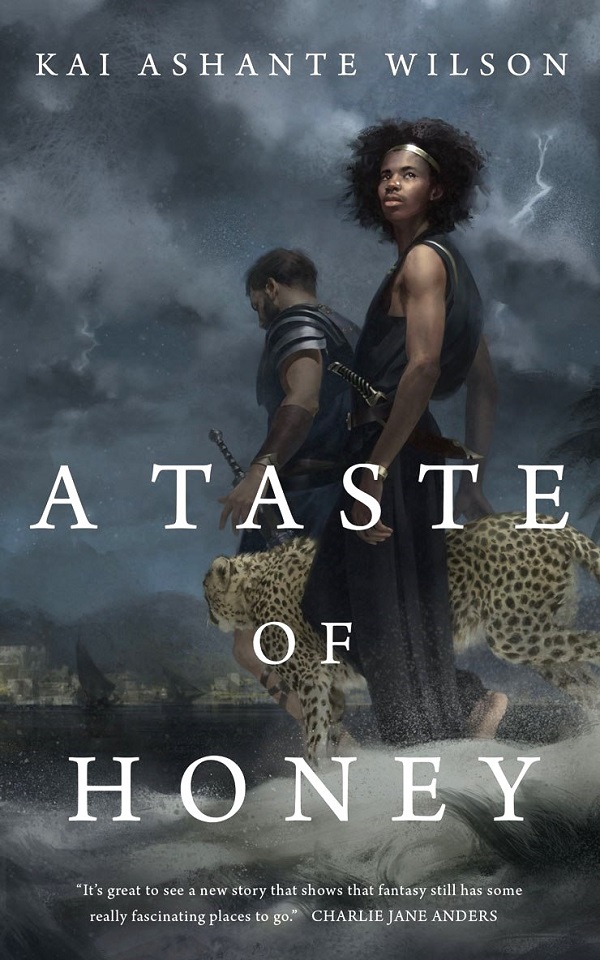 Tor.com, edited by Carl Engle-Laird
Tor.com, edited by Carl Engle-Laird
cover art by Tommy Arnold, design by Christine Foltzer
Synopsis (jacket copy): Long after the Towers left the world but before the dragons came to Daluça, the emperor brought his delegation of gods and diplomats to Olorum. As the royalty negotiates over trade routes and public services, the divinity seeks arcane assistance among the local gods.
Aqib bgm Sadiqi, fourth-cousin to the royal family and son of the Master of Beasts, has more mortal and pressing concerns. His heart has been captured for the first time by a handsome Daluçan soldier named Lucrio. In defiance of Saintly Canon, gossiping servants, and the furious disapproval of his father and brother, Aqib finds himself swept up in a whirlwind gay romance. But neither Aqib nor Lucrio know whether their love can survive all the hardships the world has to throw at them.
Set in the same world as, but not really a sequel to, The Sorcerer of the Wildeeps.
The Lost Child of Lychford, by Paul Cornell [Witches of Lychford #2] (excerpt)
cover photo by Getty Images, design by FORT
Synopsis (jacket copy): It’s December in the English village of Lychford – the first Christmas since an evil conglomerate tried to force open the borders between our world and… another. Which means it’s Lizzie’s first Christmas as Reverend of St. Martin’s. Which means more stress, more expectation, more scrutiny by the congregation. Which means… well, business as usual, really.
Until the apparition of a small boy finds its way to Lizzie in the church. Is he a ghost? A vision? Something else? Whatever the truth, our trio of witches (they don’t approve of “coven”) are about to face their toughest battle, yet!
Hammers on Bone, by Cassandra Khaw [Persons Non Grata #1] (excerpt)
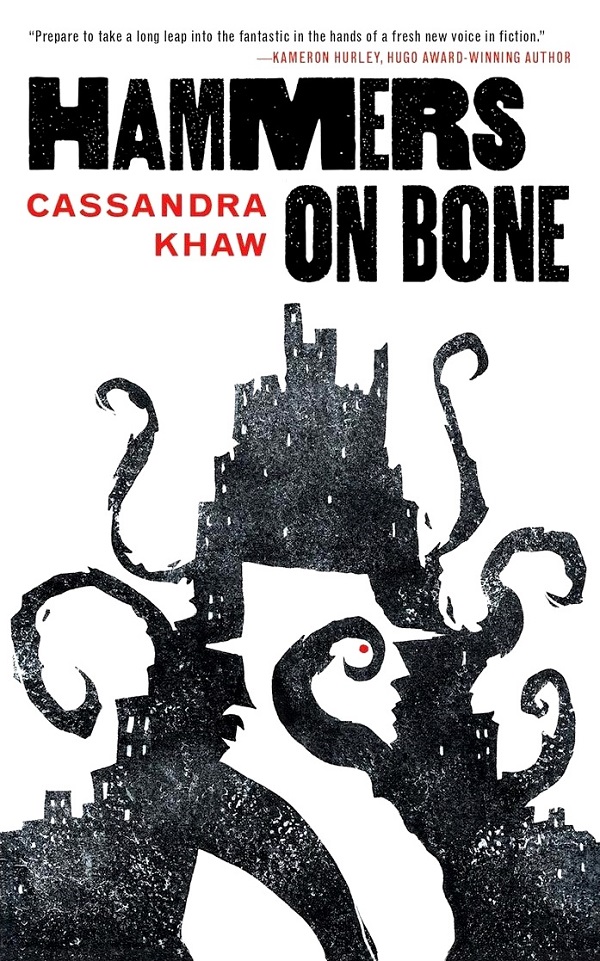 Tor.com, edited by Carl Engle-Laird
Tor.com, edited by Carl Engle-Laird
cover art by Jeffrey Alan Love, design by Christine Foltzer
Synopsis (jacket copy): John Persons is a private investigator with a distasteful job from an unlikely client. He’s been hired by a ten-year-old to kill the kid’s stepdad, McKinsey. The man in question is abusive, abrasive, and abominable.
He’s also a monster, which makes Persons the perfect thing to hunt him. Over the course of his ancient, arcane existence, he’s hunted gods and demons, and broken them in his teeth.
As Persons investigates the horrible McKinsey, he realizes that he carries something far darker. He’s infected with an alien presence, and he’s spreading that monstrosity far and wide. Luckily Persons is no stranger to the occult, being an ancient and magical intelligence himself. The question is whether the private dick can take down the abusive stepdad without releasing the holds on his own horrifying potential.
A sequel, A Song for Quiet, is due out in August 2017.
Project Clio, by Stephen Baxter (Kindle sample)
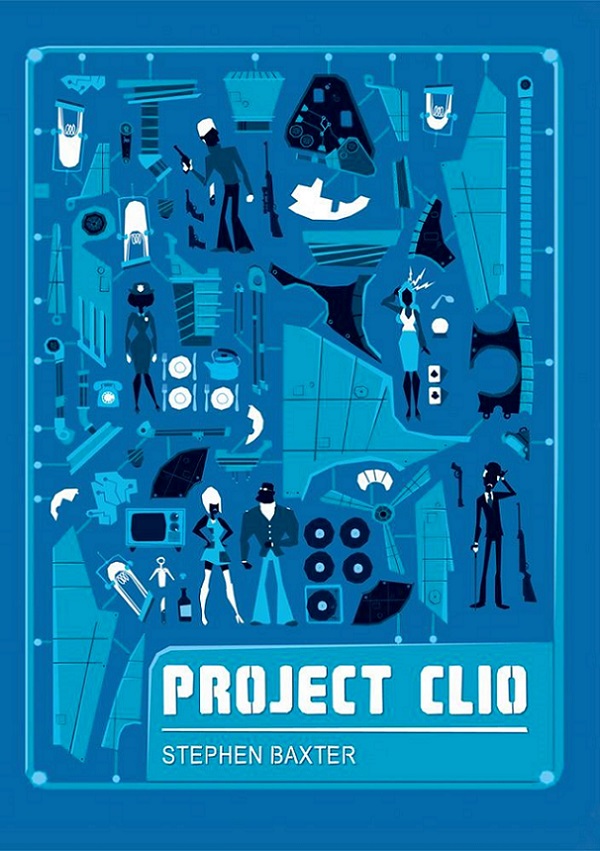 P.S. Publishing, editor unknown
P.S. Publishing, editor unknown
cover art by Ilan Sheady
Synopsis (jacket copy): For the last decade we really have been waging a secret war against super-villains. It’s just as well the general public are too common-sense to believe any of it…
It’s 1969. Astronauts have just landed on the moon. In Britain, Harold Wilson is Prime Minister. And the Avengers are on TV. Detective Sergeant Clare Seeley, juggling work and family commitments, is aware of peculiar goings-on at the heart of the concrete-jungle new town that is her patch…
Agnes Doyle, brilliant computer scientist and unwilling precognitive, is about to be plunged into a lethally perilous situation…
The Sergeant and Lucy Pennyweather, gaudy swinging-London adventurers, are drawn to a peculiar conspiracy surrounding a pirate radio ship…
Henry Messen, veteran of the First World War and a special forces operative in the Second under the cover of a bumbling Home Guard officer, is on the track of a fugitive Nazi engineer with a very strange secret…
And Thelma Bennet, head of Project Clio the Cross-Agency League of Intelligence Operatives – is closing in on a global threat.
It’s 1969. Not as you know it. The way you always thought it was.
The Days of Tao, by Wesley Chu [Tao #4] (Kindle sample)
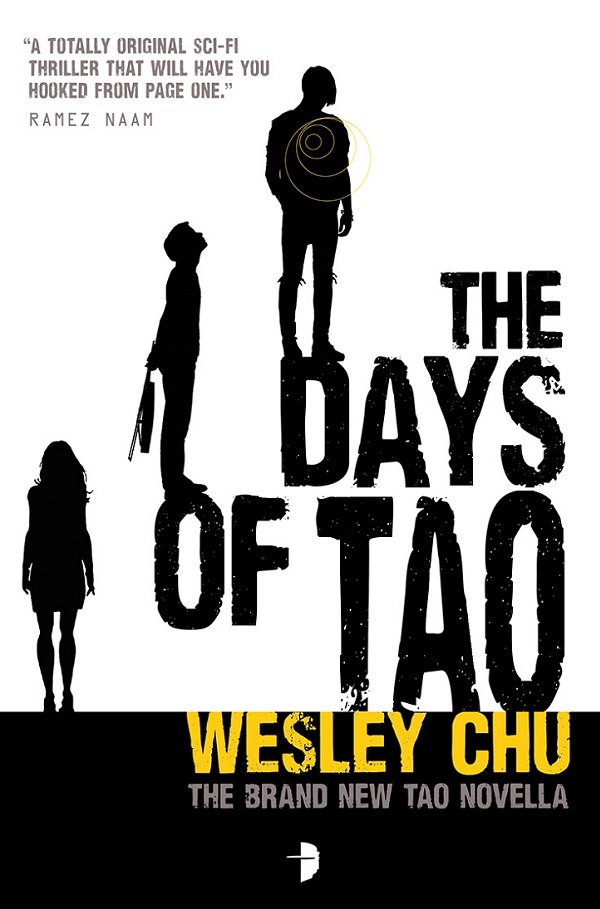
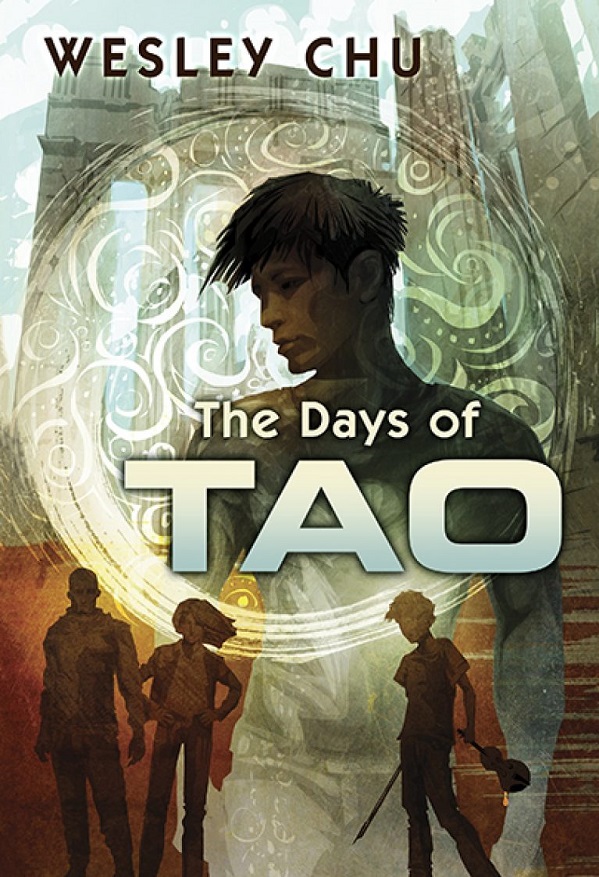 Angry Robot / Subterranean Press, editor unknown
Angry Robot / Subterranean Press, editor unknown
Angry Robot cover art by Argh! Nottingham
Subterranean Press cover art by Galen Dara, designer unknown
Synopsis (jacket copy): Cameron Tan wouldn’t have even been in Greece if he hadn’t gotten a ‘D’ in Art History. Instead of spending the summer after college completing his training as a Prophus operative, he’s doing a study abroad program in Greece, enjoying a normal life – spending time with friends and getting teased about his crush on a classmate.
Then the emergency notification comes in: a Prophus agent with vital information needs immediate extraction, and Cameron is the only agent on the ground, responsible for getting the other agent and data out of the country. The Prophus are relying on him to uncomplicate things.
Easy.
Easy, except the rival Genjix have declared all-out war against the Prophus, which means Greece is about to be a very dangerous place. And the agent isn’t the only person relying on Cameron to get them safely out of the country – his friends from the study abroad program are, too. Cameron knows a good agent would leave them to fend for themselves. He also knows a good person wouldn’t. Suddenly, things aren’t easy at all.
The Burning Light, by Bradley P. Beaulieu and Rob Ziegler (excerpt)
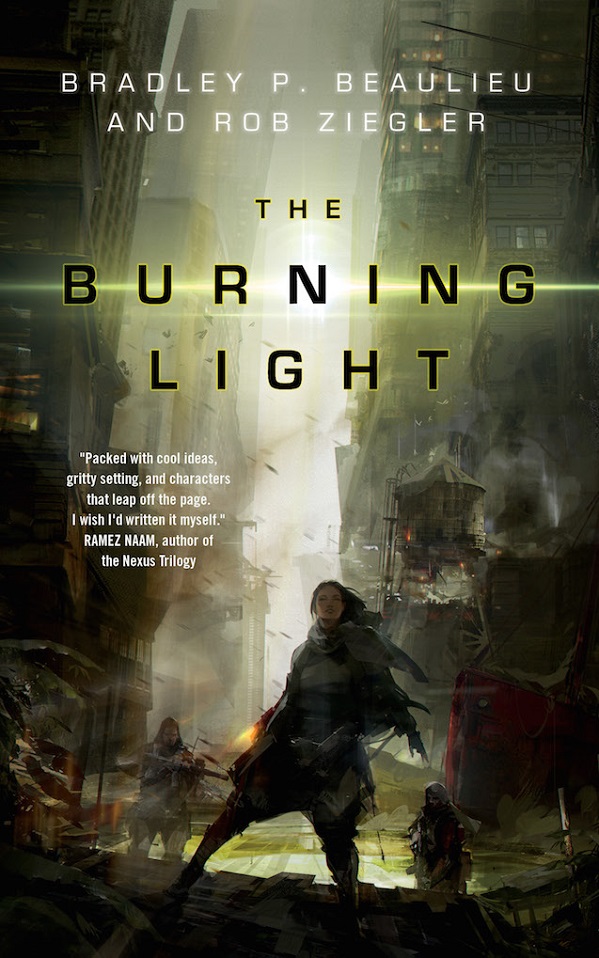 Tor.com, edited by Justin Landon
Tor.com, edited by Justin Landon
cover art by Richard Anderson, design by Christine Foltzer
Synopsis (jacket copy): Disgraced government operative Colonel Chu is exiled to the flooded relic of New York City. Something called the Light has hit the streets like an epidemic, leavings its users strung out and disconnected from the mind-network humanity relies on. Chu has lost everything she cares about to the Light. She’ll end the threat or die trying.
A former corporate pilot who controlled a thousand ships with her mind, Zola looks like just another Light-junkie living hand to mouth on the edge of society. She’s special though. As much as she needs the Light, the Light needs her too. But, Chu is getting close and Zola can’t hide forever.

